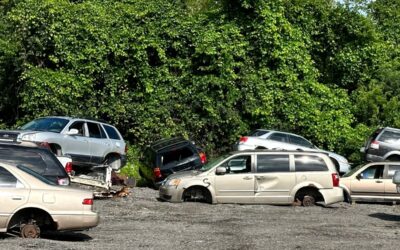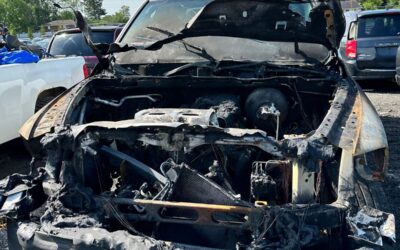Introduction
Every year, over 1.6 million cars are scrapped in Canada. These old vehicles often end up in landfills, leaking harmful fluids like oil, battery acid, and coolant that contaminate soil and groundwater. Manufacturing new cars requires fresh metals, plastics, and a lot of energy, which means putting more pressure on the planet’s limited resources.
Abandoned cars don’t just look bad on the street; they also pollute soil and water, harming both nature and human health. The production of new vehicles requires raw materials like steel, aluminum, and rare minerals, which can lead to an increase in mining activities.
Proper car scrapping helps solve these problems. Up to 90% of a car’s materials, like steel, aluminum, rubber, and plastic, can be recycled. Reusing parts reduces factory production needs, saves energy, and cuts down on pollution. Safe disposal of fluids prevents contamination, and recycling metals reduces mining by 40%. This eco-friendly process reduces waste, protects nature, and supports a greener future. Removing your scrap car the right way turns waste into useful resources.
How Car Scrapping Saves Natural Resources
Car scrapping plays a crucial role in conserving natural resources. Instead of letting old cars sit in junkyards or landfills, auto recyclers process them to recover valuable materials. These materials are then reused, reducing the need for fresh extraction. Here’s how scrapping your car helps conserve resources:
1. Reduces the Need for Mining
Car manufacturing requires a large amount of metal, primarily steel and aluminum. Mining these metals involves extracting iron ore, coal, and limestone, which damages the environment. Recycling steel from scrapped cars significantly reduces the need for new mining operations. According to the U.S. Geological Survey, recycling steel saves about 60% of the energy required to produce new steel, while recycling aluminum saves 95% of the energy used in fresh aluminum production. By recycling scrap cars, we reduce mining activities, help prevent deforestation, and decrease water and air pollution.
Also Read: Environmental Regulations You Must Know Before Scrapping Your Car
2. Lower Energy Consumption
Manufacturing new components requires significant resources and energy. Extracting, refining, and processing metals require electricity and fuel. Recycling metal from cars requires far less energy and helps lower overall energy demand. The Institute of Scrap Recycling Industries (ISRI) reports that steel recycling alone saves enough energy annually to power 18 million households. When industries use recycled metals, they consume fewer fossil fuels, which leads to lower greenhouse gas emissions.
3. Save Water Resources
Mining and refining metals need massive amounts of water. Water is used to cool equipment, wash minerals, and process raw materials. Recycling metal from scrapped vehicles reduces water consumption. Mining less helps stop harmful chemicals from washing into rivers, lakes, and underground water, keeping them clean and safe. By recycling old vehicles, we conserve clean water, essential for human survival and environmental balance.
The Role of Auto Recycling in Reducing Pollution
Car scrapping not only saves natural resources but also helps in reducing pollution. The process assures that harmful materials are disposed of correctly to stop environmental damage.
1. Controls Landfill Waste
Junk cars take up unnecessary space in landfills. Car parts such as plastic, rubber, and glass take hundreds of years to decompose. When cars are left in junkyards without proper recycling, they contribute to long-term waste issues. Recycling auto parts ensures that valuable materials don’t end up in landfills.
2. Reducing Air Pollution
Manufacturing metals and car parts from scratch releases high levels of carbon dioxide and other toxic gases. The production process involves burning fossil fuels, leading to increased air pollution. Recycling auto parts cuts down emissions because less energy is used in processing recovered materials. With fewer greenhouse gases in the air, we help lower the risk of climate change.
3. Stops Toxic Fluid Contamination
Old cars contain dangerous fluids like engine oil, coolant, transmission fluid, and brake fluid. These toxic substances seep into the ground and water when vehicles sit unused for long periods. Careless disposal contaminates groundwater and can severely damage ecosystems. During responsible scrap car recycling, auto wreckers safely remove these fluids to keep them out of the environment. By recycling your car through a genuine scrap service, you stop these harmful chemicals from damaging nature.
Also Read: Role of Scrap Car Removal in Reducing Greenhouse Gas Emissions
How Does Scrapping Your Car Help the Economy?
Auto recycling is not just good for the environment, it also benefits the economy. The process creates jobs, lowers production costs, and supports the automobile industry in numerous ways.
1. Creates Jobs in the Recycling Industry
Auto recycling creates jobs worldwide and boosts economies. This industry needs workers to take apart old cars, remove valuable materials, and handle scrap metal. In Canada alone, car recycling employs over 34,000 people and adds about $5 billion to the economy. Recycling old vehicles helps create more jobs and strengthens the economy. This process supports local communities and makes good use of resources. It’s a win-win situation for both the environment and the job market.
2. Lower Car Manufacturing Costs
Carmakers cut costs by using recycled materials to build new vehicles. They choose to use recycled steel, aluminum, and plastic instead of buying newly mined raw materials. This smart move cuts down production costs, which is great news for buyers, too. Cars become more affordable, and everyone wins. Plus, this approach makes car manufacturing more eco-friendly and sustainable. It’s a simple way to reduce waste, save resources, and keep prices in check.
3. Encourages Innovation in Green Technology
The auto industry is stepping up its game in recycling as more people want eco-friendly materials. Car companies are investing money in better recycling tech and looking for new materials to build vehicles. These improvements also help make hybrid and electric cars more efficient. When we recycle cars, we are not just helping the environment, we are pushing technology forward, too.
Also Read: Importance of Responsible Scrap Car Removal: Environmental Benefits
What Happens When You Scrap a Car?
When you scrap a car, it goes through a process of evaluation, depollution, dismantling, and recycling to remove valuable materials. Here is a breakdown of the complete process:
1. Vehicle Collection
Scrap car buyers collect scrap vehicles through organized removal services. Many car scrapyards, including Greenway Auto Recycling, offer free towing to make the process easy for car owners.
2. Depollution Process
Recyclers first remove dangerous fluids such as engine oil, coolant, and brake fluid. Batteries and tires are also separated for safe disposal or recycling.
3. Dismantling and Sorting
The scrap car is dismantled, with reusable parts such as engines, transmissions, and catalytic converters carefully removed. These parts are then refurbished and resold.
4. Shredding and Metal Recovery
The car’s body is shredded into smaller pieces, and magnetic separators extract steel and other metals. The recovered materials are sent to manufacturers, where they are reused in new vehicle production.
Why Should You Choose Greenway Auto Recycling?
If you have an old, damaged, or unused vehicle, scrapping it is the best option for the environment and economy. We at Greenway Auto Recycling offer scrap car removal services in most of the GTA area.
Go With Greenway Auto Recycling
-
- Free Car Removal: We pick up your vehicle at no extra charge.
- Eco-Friendly Recycling: We follow strict recycling practices to minimize waste.
- Fast and Hassle-Free Process: Our team handles all the paperwork, so you don’t have to deal with any hassle.
- Get Paid for Your Scrap Car: We offer competitive prices for old vehicles.
Conclusion
Scrapping an old car is a smart move for our environment and resources. Up to 90% of a car can be recycled. Choosing a responsible auto recycler makes a real difference. Greenway Auto Recycling offers scrap car removal services across all areas of the GTA and makes sure vehicles get recycled in an eco-friendly way. We take care of everything, from free pickup to proper material recovery, so you can scrap your car responsibly without any hassle. Contact us for a free quote at (416) 783-9026 and get same-day car removal.





